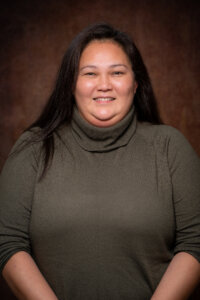By Linden Stackiokas
 Dawn Newman probably could not help becoming a health aide: her grandmother Nora and her sister Kim were both health aides before her. It was due to their example, as well as serious encouragement from Kim, that Dawn decided that she could make it through the training and join their ranks.
Dawn Newman probably could not help becoming a health aide: her grandmother Nora and her sister Kim were both health aides before her. It was due to their example, as well as serious encouragement from Kim, that Dawn decided that she could make it through the training and join their ranks.
Born and raised in North Pole, Dawn married a man from Rampart. He wanted to move home and Dawn recalls that “once we decided to live there, even before we moved, I saw the recruitment ad for a health aide for Rampart and applied.” The process of getting hired was a long one, about seven months, in part because the village had to approve Dawn as their choice before she was allowed into the stringent training program. That was seven years ago, and she has been a health aide ever since.
After working in Rampart for almost five years, Dawn wanted to make a change. Rather than leaving the program, she switched positions and became an itinerant health aide. The flexibility of making her own schedule was the deciding factor; with a husband and two girls at home, she needed a break from the intense schedule she had in Rampart. As an itinerant, Dawn could decide when and where she wanted to work. Her placements have included Northway, Circle, Eagle, Kaltag and Galena, among others.
One of the things that surprised Dawn about her job, despite growing up watching relatives doing the work and the TCC training she had gone through, was the advanced level of care health aides are expected to provide. Doing well baby checks, taking blood for lab work, establishing treatment plans, giving shots and medications, knowing when it is time to confer with physicians in Fairbanks, a health aide’s level of knowledge cannot be superficial. It is no exaggeration to say that Dawn must know enough to respond to people’s health needs at every step of their life’s journey, from birth to death.
As for all health practitioners, some of Dawn’s patients are easier to work with than others. For anyone whose job and joy it is to care for others, it is frustrating to have people who wait until a small health problem turns into an emergency, or who don’t take their medications as prescribed, or who fail to return for follow up care. Last November, there was a lengthy article in the Arctic Sounder newspaper, naming other difficulties health aides face when trying to provide treatment, including domestic violence, mental health issues, and alcohol or drug abuse. Even when these issues are not present, the calmest and most rational of people who are stressed by ill health and fear can lash out in anger or blame the health aide when they don’t get well quickly. Despite these challenges, Dawn and those she calls “my amazing co-workers” remain committed to bringing quality health care even to the remotest of villages.
She copes with the intensity of her job by using her off time to relax with her family, and, depending on the season, doing the hard physical labor of subsistence activities such as moose hunting and wood gathering. She loves to do large projects, such as the condo renovation she recently completed. She and her family take every opportunity to travel, with Las Vegas being a favorite destination.
Asked what advice she would give to a person considering a career as a health aide, Dawn said, “Make sure you are ready for the challenges. Even when you are not working, you are still representing health aides and TCC. That means you can end up doing less socializing because you can’t be partying—not only because it looks bad but because you are often on call so you can’t be impaired. But the advantages of the job are many. There is travel for training and to villages. Great co-workers and supportive supervisors. And you get to learn vast amounts of stuff that you never thought you would or could learn.”
The rewards of being a health aide were good enough to keep Dawn’s grandmother and her sister in the profession. And they are more than good enough for Dawn.
